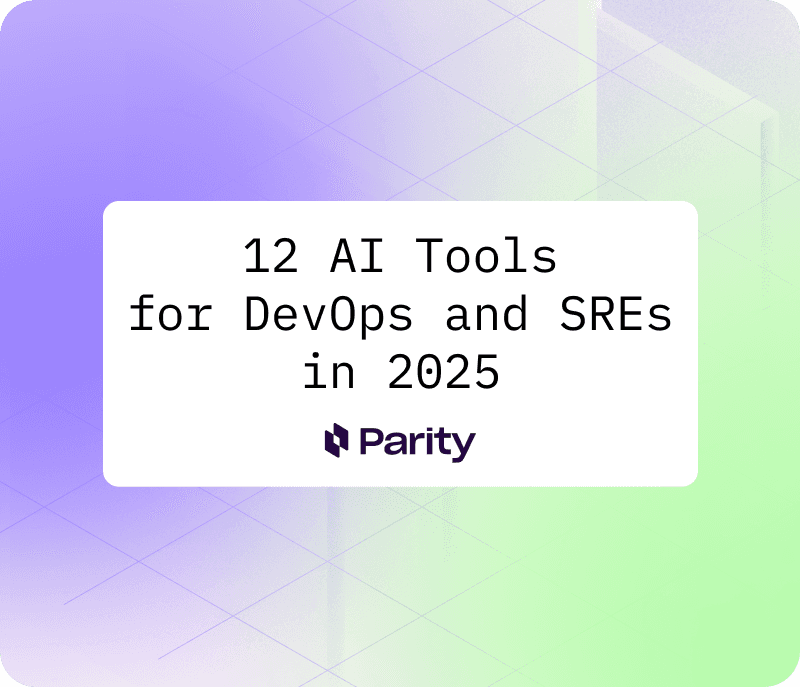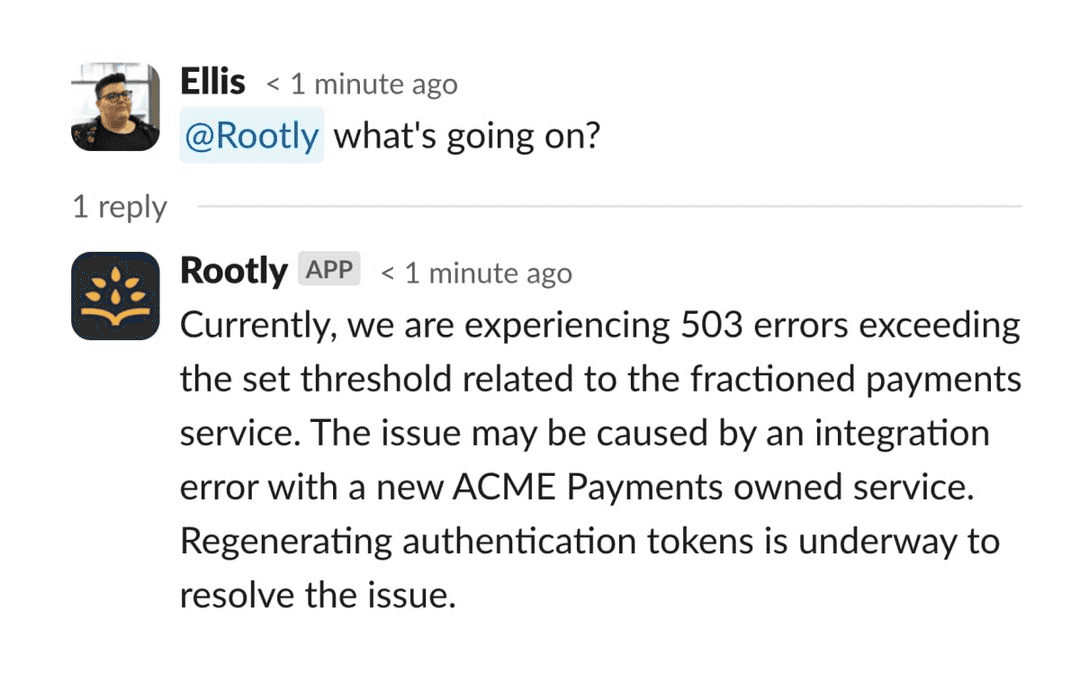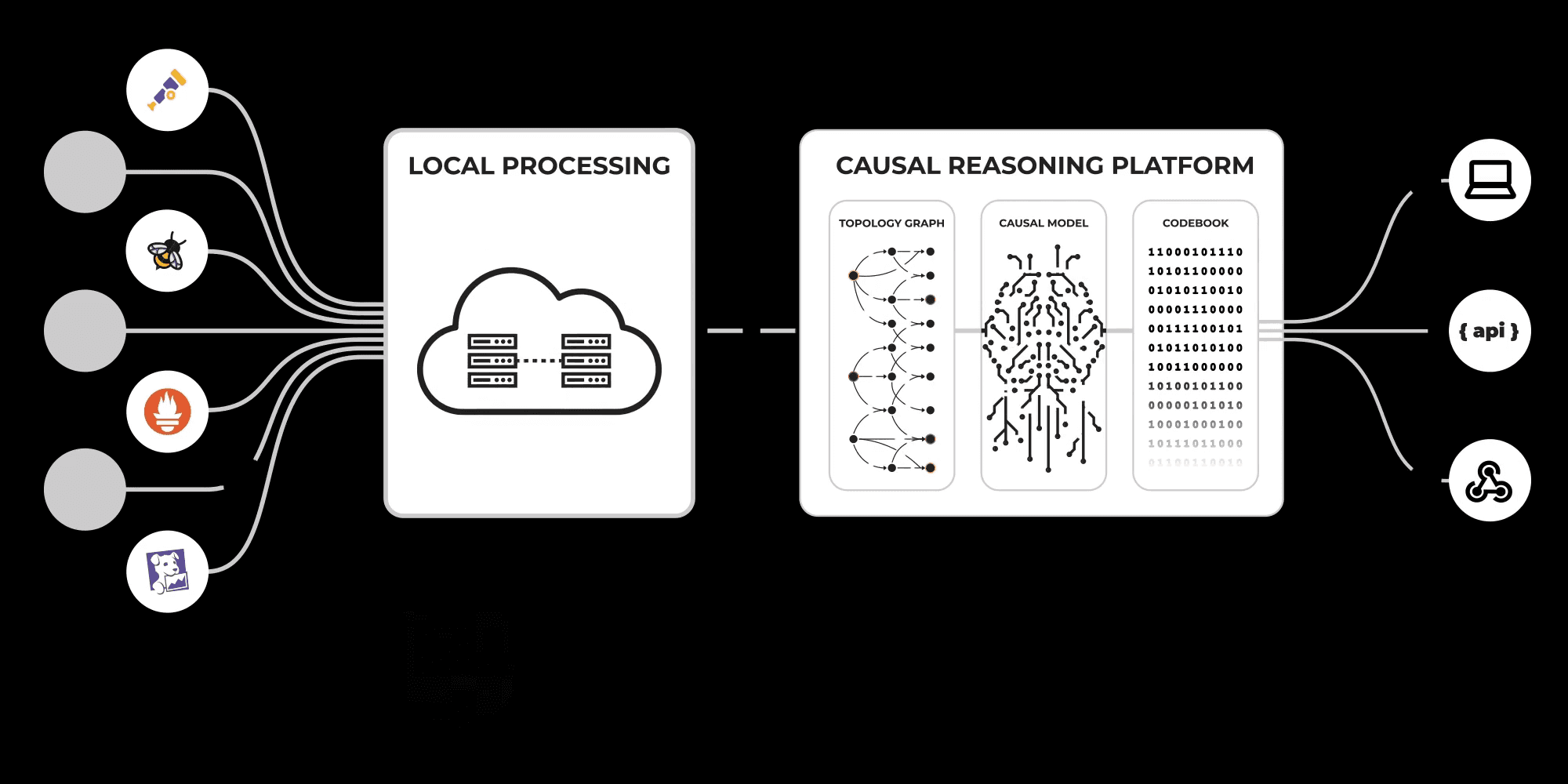


/
Jan 9, 2025
12 AI Tools for DevOps and SREs in 2025
12 AI Tools for DevOps and SREs in 2025
Here are 12 AI-powered tools for DevOps and SREs that your team should should be looking at in 2025.
Here are 12 AI-powered tools for DevOps and SREs that your team should should be looking at in 2025.

Wilson Spearman
Co-founder of Parity


AI captured our imagination in 2024. But what is AI actually doing for you and your team in 2025? If the answer is nothing, take a look at this list of tools curated for DevOps and SREs.
This isn’t just a list of all of the big names who carelessly slap “AI” on top of their platform. These are tools that are actually reimagining what DevOps and SRE should look like.
1. Incident Management
Sure, PagerDuty works, but don’t you want a tool that does more than just page you? Each of these tools for incident management is designed to help your teams respond to incidents via their incident management platform with AI-driven automation for incident workflows, postmortems, and more.

2. Incident Response
Parity: Parity is the AI SRE for incident response. It leverages AI to investigate incidents alongside your on-call engineers, speeding up MTTR and making the life of on-call engineers easier.
3. Observability & Monitoring
Mezmo: Mezmo is a log ingestion and aggregation tool that uses ML to correlate and de-duplicate logs. With the explosion in observability data, having a tool that is able to make that data useful and actionable to teams is key.
Causely: Causely takes a unique approach of using a causal model to attempt to turn observability data and alerts into specific root causes.

4. Cost Optimization
Kubecost: Kubecost provides intelligent insights into cloud spend and automated alerting.
Cast.ai: Cast.ai optimizes cloud costs by right-sizing your workloads and automating resource scaling, ensuring you only pay for what you need.
5. Software Delivery (CI/CD)
Harness: Harness is well known as a comprehensive CI/CD platform and has recently made the push to layer in AI through DevOps, QA, and code assistants natively connected to their platform.
6. Developer Tools and Miscellaneous
k8sGPT: Bring the power of LLMs directly into your Kubernetes cluster with k8sGPT. For anyone using Kubernetes for the first time, k8sGPT makes it significantly more approachable. And it’s open source!
Cursor: If you haven’t started using Cursor, you’re missing out. This AI-powered IDE makes leveraging LLMs in your coding workflow so easy.
Circleback: This is the only non-technical tool on this list, but it has been one of the most useful tools we’ve used internally! I tried several notetakers and was always disappointed with how much of the summary was just useless AI-generated fluff. Circleback seems to have somehow solved this.
Conclusion
AI is changing the way we think about DevOps and SRE, not by taking over, but by making our lives a little easier. These tools aren’t just buzzwords—they actually help you work smarter, whether it’s automating your incident response, making sense of mountains of logs, or even cutting down on cloud costs. If you’re not using AI tools yet, give a few of these a shot and see how they fit into your workflow. Who knows? You might wonder how you ever worked without them.
AI captured our imagination in 2024. But what is AI actually doing for you and your team in 2025? If the answer is nothing, take a look at this list of tools curated for DevOps and SREs.
This isn’t just a list of all of the big names who carelessly slap “AI” on top of their platform. These are tools that are actually reimagining what DevOps and SRE should look like.
1. Incident Management
Sure, PagerDuty works, but don’t you want a tool that does more than just page you? Each of these tools for incident management is designed to help your teams respond to incidents via their incident management platform with AI-driven automation for incident workflows, postmortems, and more.

2. Incident Response
Parity: Parity is the AI SRE for incident response. It leverages AI to investigate incidents alongside your on-call engineers, speeding up MTTR and making the life of on-call engineers easier.
3. Observability & Monitoring
Mezmo: Mezmo is a log ingestion and aggregation tool that uses ML to correlate and de-duplicate logs. With the explosion in observability data, having a tool that is able to make that data useful and actionable to teams is key.
Causely: Causely takes a unique approach of using a causal model to attempt to turn observability data and alerts into specific root causes.

4. Cost Optimization
Kubecost: Kubecost provides intelligent insights into cloud spend and automated alerting.
Cast.ai: Cast.ai optimizes cloud costs by right-sizing your workloads and automating resource scaling, ensuring you only pay for what you need.
5. Software Delivery (CI/CD)
Harness: Harness is well known as a comprehensive CI/CD platform and has recently made the push to layer in AI through DevOps, QA, and code assistants natively connected to their platform.
6. Developer Tools and Miscellaneous
k8sGPT: Bring the power of LLMs directly into your Kubernetes cluster with k8sGPT. For anyone using Kubernetes for the first time, k8sGPT makes it significantly more approachable. And it’s open source!
Cursor: If you haven’t started using Cursor, you’re missing out. This AI-powered IDE makes leveraging LLMs in your coding workflow so easy.
Circleback: This is the only non-technical tool on this list, but it has been one of the most useful tools we’ve used internally! I tried several notetakers and was always disappointed with how much of the summary was just useless AI-generated fluff. Circleback seems to have somehow solved this.
Conclusion
AI is changing the way we think about DevOps and SRE, not by taking over, but by making our lives a little easier. These tools aren’t just buzzwords—they actually help you work smarter, whether it’s automating your incident response, making sense of mountains of logs, or even cutting down on cloud costs. If you’re not using AI tools yet, give a few of these a shot and see how they fit into your workflow. Who knows? You might wonder how you ever worked without them.
AI captured our imagination in 2024. But what is AI actually doing for you and your team in 2025? If the answer is nothing, take a look at this list of tools curated for DevOps and SREs.
This isn’t just a list of all of the big names who carelessly slap “AI” on top of their platform. These are tools that are actually reimagining what DevOps and SRE should look like.
1. Incident Management
Sure, PagerDuty works, but don’t you want a tool that does more than just page you? Each of these tools for incident management is designed to help your teams respond to incidents via their incident management platform with AI-driven automation for incident workflows, postmortems, and more.

2. Incident Response
Parity: Parity is the AI SRE for incident response. It leverages AI to investigate incidents alongside your on-call engineers, speeding up MTTR and making the life of on-call engineers easier.
3. Observability & Monitoring
Mezmo: Mezmo is a log ingestion and aggregation tool that uses ML to correlate and de-duplicate logs. With the explosion in observability data, having a tool that is able to make that data useful and actionable to teams is key.
Causely: Causely takes a unique approach of using a causal model to attempt to turn observability data and alerts into specific root causes.

4. Cost Optimization
Kubecost: Kubecost provides intelligent insights into cloud spend and automated alerting.
Cast.ai: Cast.ai optimizes cloud costs by right-sizing your workloads and automating resource scaling, ensuring you only pay for what you need.
5. Software Delivery (CI/CD)
Harness: Harness is well known as a comprehensive CI/CD platform and has recently made the push to layer in AI through DevOps, QA, and code assistants natively connected to their platform.
6. Developer Tools and Miscellaneous
k8sGPT: Bring the power of LLMs directly into your Kubernetes cluster with k8sGPT. For anyone using Kubernetes for the first time, k8sGPT makes it significantly more approachable. And it’s open source!
Cursor: If you haven’t started using Cursor, you’re missing out. This AI-powered IDE makes leveraging LLMs in your coding workflow so easy.
Circleback: This is the only non-technical tool on this list, but it has been one of the most useful tools we’ve used internally! I tried several notetakers and was always disappointed with how much of the summary was just useless AI-generated fluff. Circleback seems to have somehow solved this.
Conclusion
AI is changing the way we think about DevOps and SRE, not by taking over, but by making our lives a little easier. These tools aren’t just buzzwords—they actually help you work smarter, whether it’s automating your incident response, making sense of mountains of logs, or even cutting down on cloud costs. If you’re not using AI tools yet, give a few of these a shot and see how they fit into your workflow. Who knows? You might wonder how you ever worked without them.
Share
HN
Revolutionize Your Incident Response
Revolutionize Your Incident Response
Transform your on-call with Parity's AI SRE. Parity works with your team to resolve incidents in seconds, not hours.
Transform your on-call with Parity's AI SRE. Parity works with your team to resolve incidents in seconds, not hours.

You may also like
You may also like


Wilson Spearman
Co-founder
Mar 20, 2025
You Spend Millions on Reliability. So why Does Everything Still Break?
Reliability's Expensive and Everything Still Breaks. Why?


Wilson Spearman
Co-founder
Mar 20, 2025
You Spend Millions on Reliability. So why Does Everything Still Break?
Reliability's Expensive and Everything Still Breaks. Why?


Wilson Spearman
Co-founder
Jan 31, 2025
Is the Helm Killer Finally Here?
AWS, Google Cloud, and Microsoft unveil kro, a k8s-native, cloud-agnostic package manager


Wilson Spearman
Co-founder
Jan 31, 2025
Is the Helm Killer Finally Here?
AWS, Google Cloud, and Microsoft unveil kro, a k8s-native, cloud-agnostic package manager
